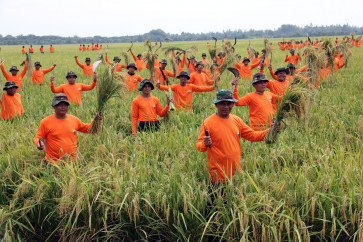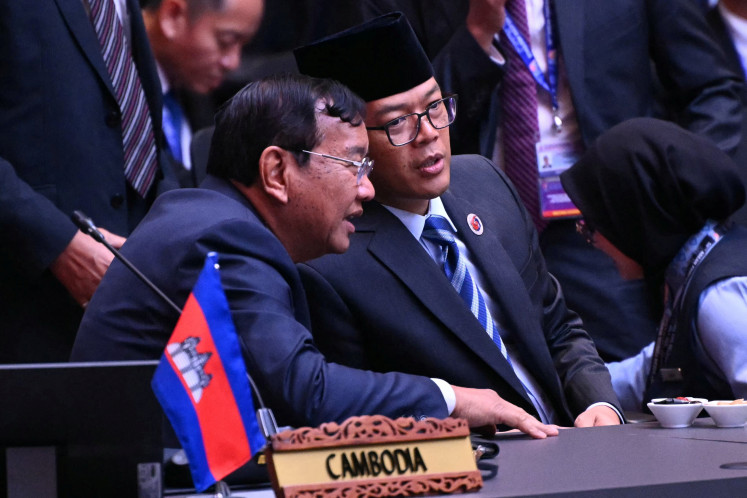Popular Reads
Top Results
Can't find what you're looking for?
View all search resultsPopular Reads
Top Results
Can't find what you're looking for?
View all search resultsFacing competition: From Go-Jek to ASEAN
The never-sleeping metropolis of Jakarta is the center of business and the gears of Indonesia
Change text size
Gift Premium Articles
to Anyone
T
he never-sleeping metropolis of Jakarta is the center of business and the gears of Indonesia. Top dollar from top executives, top investors are overflowing endlessly in the bustling city. With all the biggest enterprises centralized in the capital, Jakarta has the best climate for business in Indonesia ' or it should have.
However, five months prior to the integration of the so-called ASEAN Economic Community (AEC), reports are still indicating a degree of negativity. The headline: Economic competition is not welcome in the capital.
This is true particularly regarding small and medium enterprises, growing companies and individuals. Jakartans are yet to be appreciative of competition from outsiders, including those living just a few blocks away from their 'territory'.
The common feeling is that, 'If you come here looking for money, you have to share what you earn with the people who live here.' The situation gets worse when the newcomer is equipped with better skills and modern tools and is doing a better job.
Go-Jek is a very good example. The innovative system pioneered by Nadiem Makarim focuses on bridging the conventional and the modern. The regular ojek (motorcycle taxis) are systematically controlled under one roof, under one app.
Go-Jek is the motorcycle version of a car taxi company with its drivers supposedly benefiting much more than they would as standard ojek drivers..
The response from customers has also been exciting. No more waving, clapping one's hands, or even crying out 'Ojek!' Summoning a Go-jek is just a few taps away.
Traditional ojek drivers say Go-Jek is killing their business, with several reports of resistance and even assault on Go-Jek drivers. Signs reading 'Go-Jek not allowed in this area' can be seen in some places.
People have now started taking sides, either sympathizing with the conventional ojek drivers whose customer numbers are plummeting, or the Go-Jek drivers whose job has become increasingly risky.
Another example is the arrival of minimarkets. Minimarkets were first condemned by the locals with their lower prices, convenience and wide array of products ending the need for locally owned and operated warung.
Yet now the demand for minimarkets is rising. Foreign minimarkets have prospered, including 7-Eleven, Lawson, Family Mart and many others. Newcomers are gradually accepted by the community.
Before their recent rise in popularity, Japanese products have never seen this kind of success. This even applies to local businesses who are 'Japanese-ish', emphasizing Japan on their products.
Why are Japanese products not being rejected? It's a sense of belonging. This is arguably the most critical yet most overlooked issue.
The Japanese did not enter the market all of a sudden; they created the sense of belonging incrementally before diving into the market with their 'soft power'. Japan has been a big part of Indonesia's working-age population, as they were exposed to Japanese anime, manga, videogames and toys since they were young,. Whereas aging Indonesians still remember the Japanese occupation.
To some, the feeling towards Japan is of admiration, to others, nostalgia, social status and lifestyle or business opportunity. Indeed, it took time, but the profits are skyrocketing. If Go-Jek was a Japanese company, would there be the same rejection?
The fear of competition seems to be more psychological rather than based in economics. The resistance is selective.
People are more appreciative when competition comes from the inside, from someone they are familiar with ' as the Japanese example perhaps suggests.
Many Indonesians have their minds set on the upcoming AEC. Ask random people what they think of the AEC, and the conclusion is that people are worried, pessimistic and afraid. Even the educated ones.
Only a select handful of top businessmen think the AEC is a great opportunity. Their fear may be justified. Newcomers looking for opportunities are always willing to get paid less than the local workforce.
When the workers' abilities are on par, companies will naturally employ the cheaper ones. There is a sense of inferiority, with people fearing the qualities of the newcomers are better and that their chances of surviving in the merciless capital are narrowed.
Another worry is the increasing probability of having to work overseas. We'd rather stay in our comfort zones, even when we know it's not too comfortable.
Sad to say, but resistance is futile. The economy needs to keep going forward and it cannot do so without adjustments. Like it or not, the waves of change and development will keep coming. The choice is either to ride them, or be left behind.
Adjust or fall out of the competition. Of course, in most cases when the transition is too far ahead, a bridge needs to be created. The difficult part is getting people to cross this bridge. Everyone should move forward, and some might just need a little push.
Dec. 31 will see the launch of the AEC, but that certainly does not mean people will wake up after New Year's Eve to discover their neighbors are now foreigners. Change is to be expected.
Consequently, the AEC needs to be a success not just for the newcomers, but more importantly for the local residents.
To achieve this, the importance of creating a sense of belonging under the ASEAN flag must be emphasized. Either by building that sense before entering the market, or by gradually entering the market and letting people adjust.
In this regard, all members of ASEAN should be regarded as a family. Because the AEC stands for the ASEAN Economic Community, not ASEAN Economic Competition.
___________________
The writer is pursuing his Master's degree in regional studies at the University of Indonesia.










